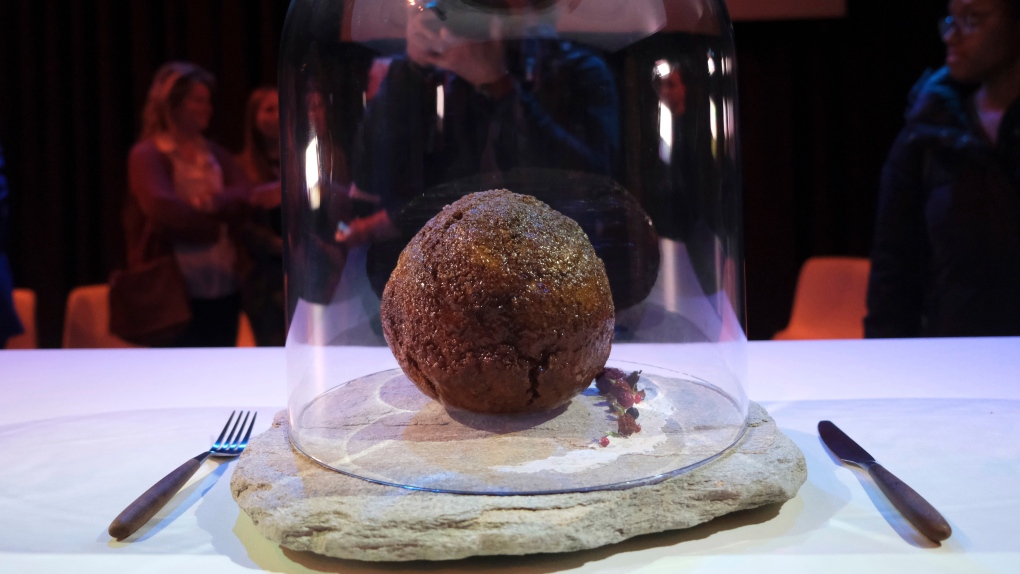AMSTERDAM -
Throw another mammoth on the barbie?
An Australian company on Tuesday lifted the glass cloche on a meatball made of lab-grown cultured meat using the genetic sequence from the long-extinct pachyderm, saying it was meant to fire up public debate about the hi-tech treat.
The launch in an Amsterdam science museum came just days before April 1 so there was an elephant in the room: Is this for real?
"This is not an April Fools joke," said Tim Noakesmith, founder of Australian startup Vow. "This is a real innovation."
Cultivated meat -- also called cultured or cell-based meat -- is made from animal cells. Livestock doesn't need to be killed to produce it, which advocates say is better not just for the animals but also for the environment.
Vow used publicly available genetic information from the mammoth, filled missing parts with genetic data from its closest living relative, the African elephant, and inserted it into a sheep cell, Noakesmith said. Given the right conditions in a lab, the cells multiplied until there were enough to roll up into the meatball.
More than 100 companies around the world are working on cultivated meat products, many of them startups like Vow.
Experts say that if the technology is widely adopted, it could vastly reduce the environmental impact of global meat production in the future. Currently, billions of acres of land are used for agriculture worldwide.
But don't expect this to land on plates around the world any time soon. So far, tiny Singapore is the only country to have approved cell-based meat for consumption. Vow is hoping to sell its first product there -- a cultivated Japanese quail meat -- later this year.
The mammoth meatball is a one-off and has not been tasted, even by its creators, nor is it planned to be put into commercial production. Instead, it was presented as a source of protein that would get people talking about the future of meat.
"We wanted to get people excited about the future of food being different to potentially what we had before. That there are things that are unique and better than the meats that we're necessarily eating now, and we thought the mammoth would be a conversation starter and get people excited about this new future," Noakesmith told The Associated Press.
"But also the woolly mammoth has been traditionally a symbol of loss. We know now that it died from climate change. And so what we wanted to do was see if we could create something that was a symbol of a more exciting future that's not only better for us, but also better for the planet," he added.
Seren Kell, science and technology manager at Good Food Institute, a nonprofit that promotes plant- and cell-based alternatives to animal products, said he hopes the project "will open up new conversations about cultivated meat's extraordinary potential to produce more sustainable foods, reduce the climate impact of our existing food system and free up land for less intensive farming practices."
He said the mammoth project with its unconventional gene source was an outlier in the new meat cultivation sector, which commonly focuses on traditional livestock -- cattle, pigs and poultry.
"By cultivating beef, pork, chicken, and seafood, we can have the most impact in terms of reducing emissions from conventional animal agriculture and satisfying growing global demand for meat while meeting our climate targets," he said.
The jumbo meatball on show in Amsterdam -- sized somewhere between a softball and a volleyball -- was for show only and had been glazed to ensure it didn't get damaged on its journey from Sydney.
But when it was being prepared -- first slow baked and then finished off on the outside with a blow torch -- it smelled good.
"The folks who were there, they said the aroma was something similar to another prototype that we produced before, which was crocodile," Noakesmith said. "So, super fascinating to think that adding the protein from an animal that went extinct 4,000 years ago gave it a totally unique and new aroma, something we haven't smelled as a population for a very long time."
------
Associated Press reporter Laura Ungar contributed from Louisville, Kentucky.









































